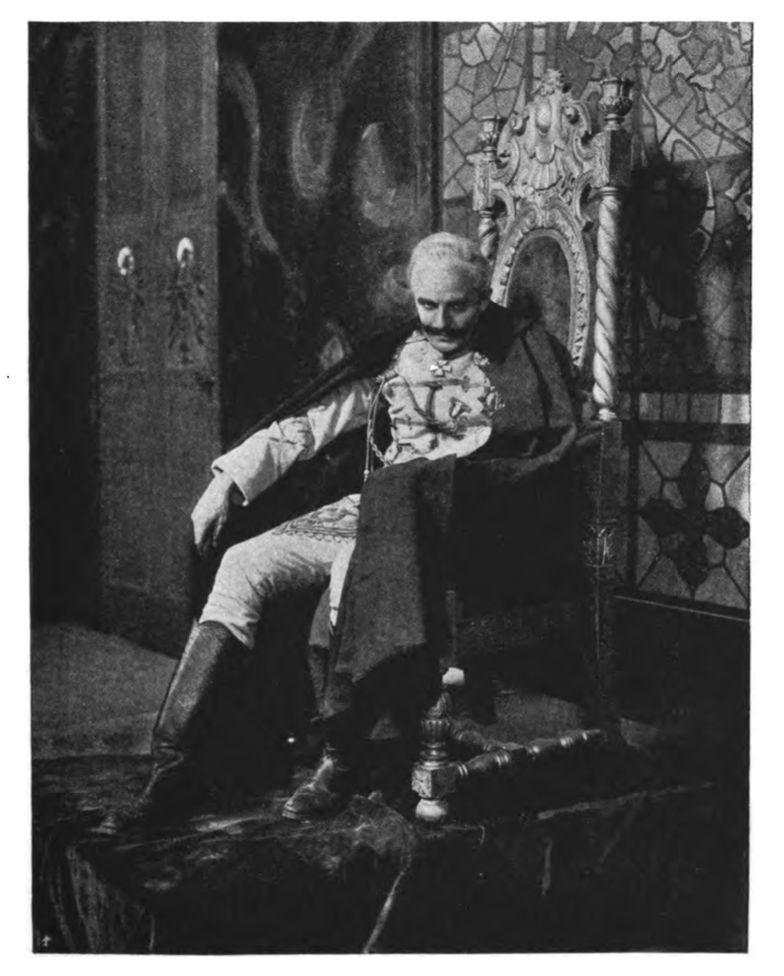BLOOD AND IRON (7)
By:
December 23, 2023

“Blood and Iron: A Play in One Act,” A Radium Age proto-sf ancestor of The Six Million Dollar Man and RoboCop, was first published in the December 1917 issue of The Strand. (Note that the play predates Karel Čapek’s “R.U.R.: Rossum’s Universal Robots” by four years.) HiLoBooks is pleased to serialize it here for HILOBROW’s readers.
ALL INSTALLMENTS: 1 | 2 | 3 | 4 | 5 | 6 | 7 | 8.
241: “Blessed — are — the — meek — for — they — shall — inherit — the — earth.”
(SCIENTIST turns to EMPEROR and bows, the book still open in his hands.)
EMPEROR: He is right. I am familiar with Matthew. Turn to another page.
(SCIENTIST opens the Bible elsewhere. Holds it up.)
SCIENTIST (To 241.) Attention! Read.
241: Isaiah — Third — Chapter — fifteenth — verse. “What — mean — ye — that — ye — beat — my — people — to — pieces — and — grind — the — faces — of — the — poor — saith — the —Lord — God — of — Hosts.”
SCIENTIST: STOP!
(EMPEROR leans back in his chair under stress of great emotion, his hand sweeping his brow repeatedly. SCIENTIST closes the book, bows again with greater humility and returns the book to EMPEROR.)
EMPEROR (Takes book and thrusts it in his bosom.): His powers are diabolical. I wish to experiment with him alone. (Relaxes and gazes vaguely into the distance. SCIENTIST drops portfolio and coat on settee.) Hasten! I will summon you with that bell. (241 remains stolidly at attention, an expression of awakening purpose in his eyes.)
SCIENTIST: Your Majesty commands.
(Bows elaborately. Exit Left. EMPEROR with Imperial dignity stares 241 down after a duel of the eyes, imposing his will upon the soldier. Follows a moment of inspection in which wonderment is the dominant note. Rises from the throne and walks slowly halfway around the impassive soldier, studying him critically. EMPEROR’s expression changes to bewilderment tinged with fear. The situation is uncanny.)
EMPEROR: Where were you born?
241: In — the — South — Majesty.
EMPEROR: Your trade?
241 (With a helpless, involuntary gesture, extending his hands.) I — was — a — florist. (EMPEROR stares at the metal hands, 241 observing the expression.) I — made — bouquets. Not — with — these — (EMPEROR averts his face) but — with — my — absent — hands.
EMPEROR (Reseating himself.) War is not a festival of flowers.
241: Majesty — a wreath — I could make — slowly — for the dead.
(He leans toward the EMPEROR.)
EMPEROR (Observing the somewhat cynical note of the soldier, becomes grave.): Are you not grateful to Science for these wonders performed? (241 salutes.) Speak!
241: What — shall — I — say?
RADIUM AGE PROTO-SF: “Radium Age” is Josh Glenn’s name for the nascent sf genre’s c. 1900–1935 era, a period which saw the discovery of radioactivity, i.e., the revelation that matter itself is constantly in movement — a fitting metaphor for the first decades of the 20th century, during which old scientific, religious, political, and social certainties were shattered. More info here.
SERIALIZED BY HILOBOOKS: James Parker’s Cocky the Fox | Annalee Newitz’s “The Great Oxygen Race” | Matthew Battles’s “Imago” | & many more original and reissued novels and stories.
